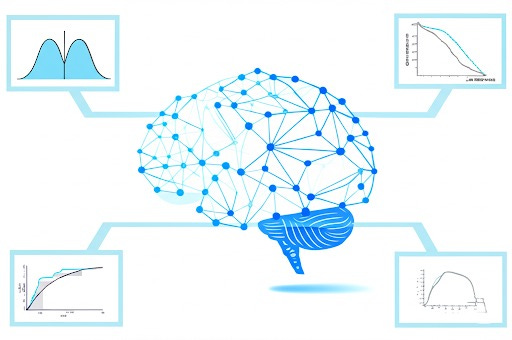Generative AI Reasoning Without Confidence Limits: Implications for Individuals and Society
When I was studying biostatistics and epidemiology at Yale's School of Public Health, I spent hours analyzing confidence intervals and p-values. Little did I know that these seemingly technical concepts would become deeply relevant to one of the most profound technological shifts of our time.
As I transitioned after medical school to Stanford for graduate work in clinical informatics and health services research, my interests expanded beyond traditional biostatistics. I became fascinated by information theory, the value of information, and reasoning under uncertainty. These weren't just academic interests—they fundamentally changed how I understood decision-making in complex systems.
Today, as I watch the rapid advancement of generative AI, I'm struck by how my academic journey has helped me to recognize a critical gap in these powerful systems: they lack clear confidence limits in their reasoning processes. And this limitation has far-reaching implications for all of us.
Understanding AI Reasoning and Confidence
Modern generative AI systems can produce impressively coherent text, images, and even code. They can synthesize information, generate creative content, and appear to reason through complex problems. But appearances can be deceiving.
Unlike the statistical methods I learned at Yale, where confidence intervals explicitly quantify uncertainty, today's AI systems typically provide outputs without meaningful indications of their confidence levels. They'll confidently generate an answer to nearly any question—whether they actually "know" the answer or not.
This reminds me of a key insight from my Stanford days studying heuristics and biases: humans are notoriously poor at calibrating their own confidence. We tend to be overconfident in our knowledge and underestimate our uncertainty. The difference is that humans can be taught to recognize and compensate for these biases—but current AI systems have this overconfidence baked into their design.
The Individual Impact
When an AI system confidently provides information without appropriate uncertainty indicators, it creates a troubling dynamic. During my health services research work, I observed how clinicians sometimes deferred to information systems even when their own judgment suggested otherwise. The apparent authority of the system created a psychological pressure to conform.
We're seeing this same dynamic play out with generative AI, but at a much larger scale. When ChatGPT confidently states a fact (that happens to be wrong) or Midjourney creates a convincing but historically inaccurate image, many users lack the context to question these outputs. The system's confidence becomes our confidence.
As someone who spent years learning how to properly analyze epidemiological data, I find this deeply concerning. When we outsource our reasoning to systems that don't properly express their limitations, we risk making important decisions based on unfounded certainty.
Societal Implications
The implications extend far beyond individual decision-making. In public health—my first field of study—we know that information quality directly impacts health outcomes. When information systems propagate high-confidence but low-accuracy information, the consequences can be serious.
Consider how generative AI is now being integrated into search engines, educational tools, and even clinical decision support systems. Without proper confidence limits, these systems risk:
- Amplifying misinformation by confidently stating inaccuracies.
- Eroding trust in expertise when AI contradicts established knowledge.
- Creating confusion in fields where structured reasoning under uncertainty is crucial.
My experiences in clinical informatics taught me that information systems don't just deliver information—they reshape professional practices, educational approaches, and institutional structures. AI systems that reason without appropriate confidence limits are already beginning to reshape our information ecosystem in potentially harmful ways.
Toward Better Solutions
So what can we do about this? My cross-disciplinary background suggests several approaches:
First, technical improvements are possible. Just as epidemiological methods explicitly quantify uncertainty, AI systems can be designed to express confidence limits more effectively. Some research labs are already working on better uncertainty quantification in large language models.
Second, of course we need better AI literacy. My time at Stanford showed me how important it is to understand the limitations of information systems. We need educational frameworks that help people interpret AI outputs with appropriate critical skepticism.
Third, we need thoughtful evaluation and regulation in high-stakes domains. When AI systems make or influence decisions about health, safety, or rights, they should be held to standards that include appropriate expression of uncertainty—just as we would expect from human experts.
Moving Forward With Eyes Open
My journey from Yale's public health classrooms to Stanford's informatics labs taught me that understanding uncertainty isn't just a technical requirement—it's a cornerstone of responsible information system design. As we continue to integrate AI into our daily lives and critical systems, we need to bring this understanding to bear.
The methodological rigor of epidemiology combined with the systems thinking of informatics provides a valuable framework for ensuring AI amplifies human potential rather than undermining our decision-making capabilities. We need to demand AI systems that reason not just powerfully, but also transparently—with appropriate awareness of their own limitations.
The stakes are too high to accept anything less. As someone who has spent years studying how we reason under uncertainty, I believe this may be the defining challenge of the AI era: creating systems that know what they don't know, and tell us honestly about it.
What experiences have you had with AI systems expressing unwarranted confidence? I'd love to hear your thoughts in the comments.



